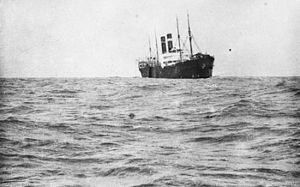HMT Southland

HMT Southland after torpedo hit in September 1915
|
|
| History | |
|---|---|
| Name: |
|
| Owner: | International Navigation Company |
| Operator: |
|
| Port of registry: | |
| Route: |
|
| Ordered: | July 1899 |
| Builder: | |
| Yard number: | 341 |
| Launched: | 12 July 1900 |
| Maiden voyage: | Antwerp – Southampton – New York, 8 December 1900 |
| Fate: | Sunk on 4 June 1917 by U-70 |
| Notes: |
|
| General characteristics | |
| Class and type: | ocean liner |
| Tonnage: | 11,899 GRT |
| Length: | 560 ft 10 in (170.94 m) |
| Beam: | 60 ft 2 in (18.34 m) |
| Propulsion: | |
| Speed: | 15 knots (28 km/h) |
| Capacity: |
|
| Crew: | 121 |
| Notes: | two funnels, four masts |
SS Vaderland was an ocean liner launched in July 1900 for the Red Star Line service between Antwerp and New York. During her passenger career, the ship initially sailed under British registry, but was re-registered in Antwerp in 1903. Vaderland was a sister ship to Zeeland and a near sister ship to Kroonland and Finland.
After the beginning of the First World War, Vaderland was re-registered in Liverpool and converted to a troopship, ferrying troops of the Canadian Expeditionary Force from Halifax to Liverpool. While under the operation of White Star–Dominion in 1915, she was renamed Southland to avoid the German-sounding Vaderland.
In September 1915, Southland was torpedoed in the Aegean Sea by German submarine UB-14 with the loss of 40 men. The ship was beached, repaired, and returned to service in August 1916. While in service between the United Kingdom and Canada in April 1917, Southland was torpedoed a second time, this time by U-70; she was sunk off the coast of Ireland with the loss of four lives.
In July 1899, the Red Star Line announced plans for the construction of four large steamers. Two ships, Vaderland and Zeeland at John Brown & Company of Clydebank in Scotland, and two others, Kroonland and Finland, were to be built at William Cramp and Sons in Philadelphia. Owned by American Line and managed by International Navigation Co. Ltd. London, she was 11,899 gross tons, and after modification provided accommodation for 342 1st class, 194 2nd class and 626 3rd class passengers.
...
Wikipedia
